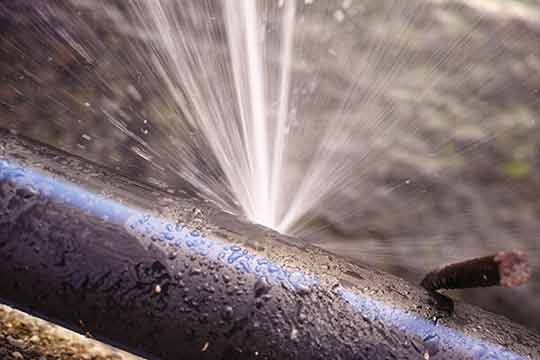
Your water line is the most crucial water pipe in your home because it is through that single pipe that clean water accesses your home. A broken water line can cause massive flooding in your home and leave you with thousands of dollars worth of property damage, warns Pro X Property Management.
Even minor problems with the water line may leave your home without water for hours or even days. That is why it is vital to not take the water line for granted but to be aware of early warning signs of trouble with this all-important component of your home’s plumbing.
What are the telltale signs that your water line is damaged?
No access to water
This is the most obvious sign of a broken water line. But a significant leak will happen before cutting off the water supply to your home.
Low water pressure
A leak along the water line will cause a drop in water pressure in the entire home. Low water pressure in a section of the plumbing is usually not due to problems with the main water line.
Strange noises
Whistling and clanging sounds from the plumbing may be a sign of leaks in the water line or a sign that one of the pipes in the system is loose.
Water pooling
There may be a leak in your water line if water is constantly pooling in parts of the yard, an area of the lawn is unusually green, or one part of the landscaping is always wet.
Discolored water
Discolored water happens when soil finds its way into the pipe through a leak or from rust within the pipes.
Finding a water line repair plumber
If these problems happen in your home, you need a water line repair plumber to inspect your home’s water line. What should you look for before you hire a water line repair plumber? The right water line repair plumber should satisfy the following criteria.
Should be local
Give preference to local plumbers. You want your water line repair plumber to be accessible and familiar with typical water and plumbing issues in the area. You want someone who understands local building codes and knows the layout of the homes in your neighborhood. This knowledge is vital for the speedy resolution of the problem.
Must be licensed and insured
Most municipalities require plumbers to be licensed. Your water line repair plumber should have years of experience working in the area. In addition to being licensed, you want to know how much insurance the plumber carries. They should have enough insurance to cover their employees in case of injury, protect your property and shield you from liabilities.
What others say about them
A local plumber who has been in the area for a while should have past and current customers that they can refer to you. Customers will usually be happy to vouch for a plumber if the plumber provides good service. You may also want to check online – on sites like Yelp! or Google – to see what others say about the plumber.
How will they diagnose the problem?
The best water line repair plumbers use sophisticated diagnostic tests that help them to pinpoint the cause and location of the problem. Plumbers will often do a camera inspection of your water line. This method will let the plumber see the problem in detail without any need to dig up your yard to access the water line.
The method of repair
You can repair a main water line using invasive or non-invasive methods. Invasive methods involve digging, which not only takes time but costs more – you have to fix the pipes and repair your lawn. Non-invasive methods do not require excavation; plumbers can fix the pipes without unearthing them. You can complete this low-impact solution in one day. It costs less.
Duration of repair
Water line problems can devastate your home. The longer it takes to fix the problem, the greater its impact on your household. A good water line repair plumber should be able to repair your pipes in the shortest time. Typically, they should be able to complete the repairs in one day or less.
Transparent pricing
How will they charge you; what pricing model do they use? You want a plumber who uses upfront flat-rate pricing. With this method, you know what it will cost you to fix the broken water line. Furthermore, all items included in the cost should be stated clearly, including the type of materials and their prices.
Guarantees and warranties
Do they offer guarantees and warranties? What is the extent of the warranties? Does it cover the plumber’s charges and all the parts used in the repair? If there is a problem with the repair, what are the procedures for addressing them? Will the plumber fix the issue at no cost to you? How long does the guarantee last?

